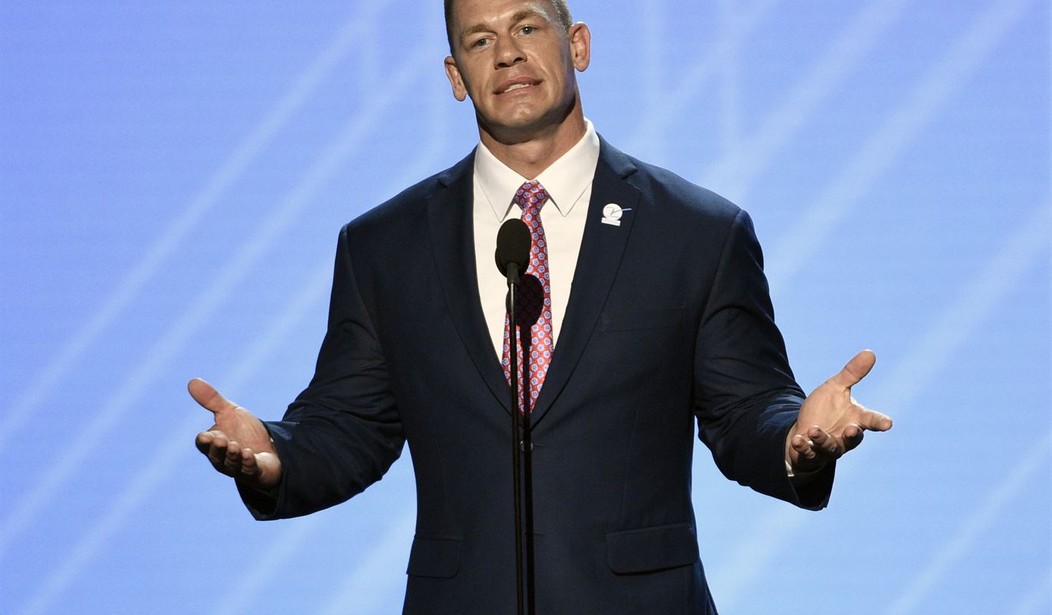I want to call this a happy ending to last week’s humiliation, but you and I both know that the wrong lesson will be learned from it.
Hollywood won’t look at the failure of “F9” and conclude that it’s pointless to apologize after offending Chinese nationalism.
They’ll conclude that all personnel need to redouble their efforts not to offend Chinese nationalism in the first place, as there’s no undoing the damage once it’s done.
Maybe the movie just sucks?
After two laps, the Vin Diesel/John Cena action flick has totaled $185.3 million. That’s slightly ahead of where franchise spinoff Hobbs & Shaw was sitting at a similar point in its China run, but far weaker than the preceding franchise mainstays Furious 7 and The Fate of the Furious, which topped out at $390.9 million in 2015 and $392.8 million in 2017, respectively. Chinese ticketing app Maoyan currently projects F9 to finish at $211.9 million — certainly not a number to scoff at but far inferior to the franchise’s recent heights, especially since China’s theatrical market is back to full earning capacity (see the $825 million earned by local comedy hit Hi, Mom in February).
Whether John Cena’s humiliating Taiwan/China gaff has had anything to do with F9‘s weak legs in the Middle Kingdom is difficult to determine. The Chinese market tends to be far more front-loaded and sensitive to real-time word of mouth than most territories, and F9 has been hit by withering reviews from the start. Its social scores are 7.5 on Maoyan and 5.5 on Douban — lower than most major titles released this year. Still, earlier in its run the film was forecasted to earn significantly more, and Cena’s public relations debacle certainly hasn’t helped. The former wrestler referred to Taiwan as a country during a promotional interview, and then issued a groveling apology to outraged nationalistic Chinese fans — for which he subsequently was widely derided in the West.
The box office dropped 85 percent between weeks one and two, with Cena’s apology having come in between. Maybe his willingness to abase himself had a “Streisand effect” in which he inadvertently called more public attention to him having described Taiwan as a “country” earlier this year.
Either way, there’s no indication in THR’s story that the Chinese government had “F9” pulled from any theaters to limit its box office. Either this was a popular boycott by Chinese fans or there’s simply a cultural “understanding” that when a critic challenges Chinese national prerogatives it’s the people’s duty to punish him.
Or, again, maybe the movie’s just terrible.
Chinese media is delighted to see Cena groveling regardless:
The Global Times, a tabloid under the auspices of the Communist Party of China, praised Cena for the “timely apology,” saying in an editorial on Wednesday that it “reveals his willingness to uphold the values of China” and “sets a good example for all Westerners to follow.”
His attitude “is something other Westerners, especially Hollywood stars, should learn from and follow,” the newspaper said.
“Cena showed that he realizes the importance of respecting the one-China principle, which is a red line for Chinese people, and also demonstrated that he knows how important the Taiwan question is to the people of China by quickly apologizing for his mistake,” the Global Times wrote.
The Global Times was conciliatory but Newsweek notes that the most popular comments on Cena’s apology video on China’s Weibo social-media platform criticized him for not going far enough and affirmatively stating that Taiwan isn’t a country, that it rightly belongs to China. There’s a carrot-and-stick dynamic to the pressure on Hollywood, in other words. By showing your remorse and obeisance to Beijing — “a good example for all Westerners to follow” — you may be formally forgiven and retain access to China’s market. But your initial transgression may so offend Chinese popular pride that that market ends up being closed off to you anyway by the people themselves.
Remember, Cena’s a guy who went to the extraordinary length of learning Mandarin, a difficult language, as an adult in order to better ingratiate himself to Chinese audiences. That’s how eager he was to earn their money. The percentage of American star actors and athletes who’ve done that must be a tiny fraction of one percent. And yet even that guy can be summarily abandoned by fans if he utters one false note of criticism, apology or no apology.
It makes me wonder if his obsequiousness paradoxically helps explain why he was made an example of. The message is “If we’ll ice him out after he worked so hard to win us over, imagine what we’ll do to your film/sport if you step out of line.”








